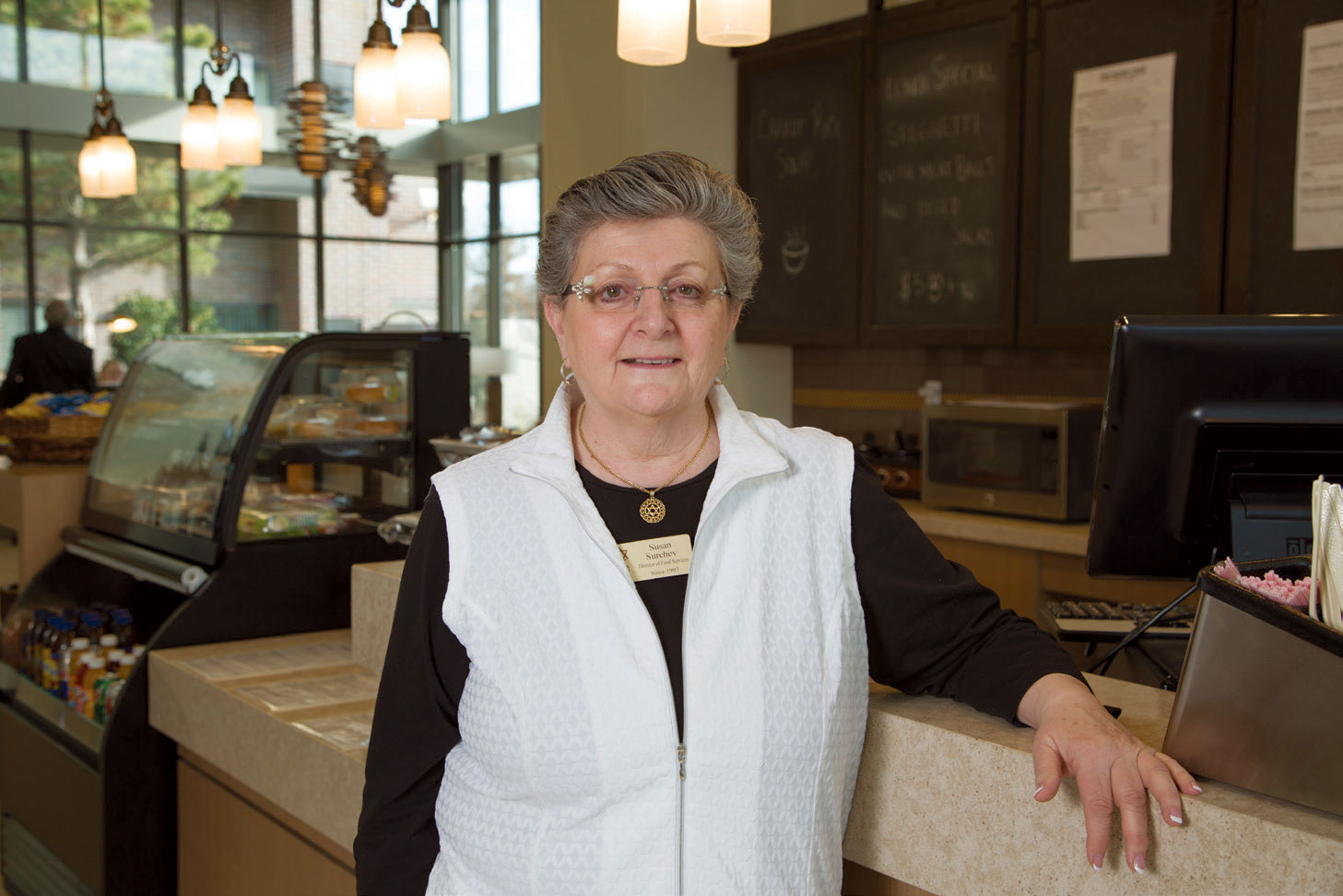Kosher Kitchen Seasons Everything With Tradition
To many of us in Oklahoma, the concept of keeping kosher is just that, a concept, something foreign to our daily life and irrelevant to our eating habits. But those who keep kosher are following a religious practice that has roots in Jewish culture dating back 4,000 years and has strict rules on what food can be eaten, and how that food can and cannot be prepared.
Located on the Zarrow Campus is the Tulsa Jewish Retirement and Health Care Center (TJRHCC). Every meal made inside the building is kosher, including food for the residents and the food in the lobby café.
As you can imagine, keeping a kitchen up to standards that are above and beyond a typical commercial kitchen is no easy undertaking, but one woman, Susan Surchev, has been managing this task for over 17 years as the director of food services. A transplant from the former Czechoslovakia, Surchev made her way to the U.S. in 1983, with zero understanding of the English language. Even though she had training from culinary school, a master’s in education and had taught in culinary programs in former Yugoslavia, Poland and East Germany, she came to the U.S. to work as a maid in South Carolina.
She soon moved to California, where she was able to continue her career with food and received extensive training with the orthodox union to become a kosher supervisor, or Mashgiach.
“In culinary school we learn everything, but kosher rules are very strict,” said Surchev
The extensive training is set in place so that you know how to provide meals in massive production, while still offering food that follows kosher law.
“You can substitute lots of things,” said Surchev.
She goes on to say that food can be prepared in numerous ways so that the people eating it won’t even know the ingredients are different. One example of this necessary substitution is in her beef stroganoff recipe. A traditional beef stroganoff includes the combining of beef with cream or milk and sour cream, but because one of the central rules of kosher forbids the eating of meat and dairy together, this recipe is categorically unacceptable. So in order to provide a beef stroganoff to her diners, she uses nondairy creamer, and to create that sour flavor she adds vinegar and tomato paste. This creates nearly the same flavor, texture and even color without having to compromise the kosher principles.
When Surchev began at TJRHCC they were already an operational kosher kitchen but it was her job to expand their menus. Even with her many years of experience in kosher kitchens, Surchev had to do extensive research once she arrived in Tulsa to find out what food products she could buy from Oklahoma distributors to meet the strict demands.
“Nothing in the building [regarding food] is here without my approval,” said Surchev. She is there to oversee every food delivery and to make sure that the kosher law is being followed in every aspect of the kitchen.
Most of the food purveyors have a sufficient amount of kosher products, but when it comes to the meat, that is a different story. In order for meat to be considered kosher it has to be slaughtered in accordance with Jewish law and a kosher slaughterhouse is something that is impossible to find in Oklahoma. Because of this hindrance, all of the meat in Surchev’s kitchen is from a grocer in New Jersey and is shipped to Oklahoma.
Another speed bump in her daily meal preparation is following the state’s dietary law guidelines to meet all of the nutritional allowances for their residents, while still staying with their own religious standards. Other communities can access menus online and base their food options on them, but Surchev does not have that luxury. This means her menu prep faces another step of meeting with a registered dietician to evaluate the dietary needs per day and per week to ensure that they are meeting these further strict guidelines.
For someone who is familiar with a commercial kitchen, but unfamiliar with a kosher kitchen, walking into Surchev’s environment is like entering a familiar home where something is slightly out of place. That is because it is essentially separated into multiple kitchens. One is dedicated to meat preparation and cooking, another is solely dedicated to dairy and finally a neutral location is also included that can have neither meat nor dairy. Each one contains prep stations, a refrigerator and everything needed to cook on and with. Each container, pot, pan, serving utensil and anything else needed to prepare the food is labeled with a color: red stays in the meat kitchen and blue stays in the dairy kitchen, everything else stays in the neutral area.
“A funny way I explain it is, it’s like crossing a border illegally to take something out of one kitchen and into another,” said Surchev. It’s against the rules.
Even though the challenges might seem vast to someone who has no experience with this food, it seems to me Surchev wouldn’t have it any other way. In her interaction with diners, residents and even the way she praises her own employees, I speculated that she has a greater purpose than simply providing food. This notion was confirmed when she shared some of her background.
She is the child of Holocaust survivors. Because of this, she says that she made a promise to herself when she came to this country. “I would always be helpful to the Jewish people and really find a way to give to the Jewish community and this is my way of paying back to my family and everybody else that I could.”
In August the TJRHCC opened a café in their lobby, called The Nosh Café, and it is under the direction of Surchev as well. It also has the distinction of being the only kosher café in Tulsa and here, five days a week, patrons can get hot breakfast and lunch. Just remember that you might get a delicious Reuben or Philly sandwich, but don’t expect any cheese on it.
As if feeding people at TJRHCC and The Café are not enough, their kitchen is also called upon to provide service to the Tulsa and Jewish community by catering events outside of their facility.
“We are also able to provide meals for restaurants that have larger functions and need a kosher option,” said Surchev.
When other restaurants and facilities do not have the right kitchen setup or knowledge base to provide kosher food they ask Surchev and her kitchen for catering help. they do what they can to assist them and help meet their needs.
Maybe Surchev said it best when she said, “Jewish people eat a lot and food has always been important. You mourn, you eat. You celebrate something, you eat,” and she is doing her best to continue this tradition. It seems her reputation and experience have led her to a place where she is able to keep that promise she made to herself more than 30 years ago.
For more information about the Tulsa Jewish Retirement and Health Care Center visit TJRHCC.org or call 918.496.8333





